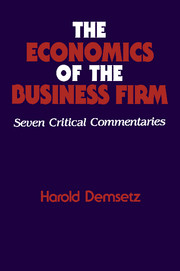Book contents
- Frontmatter
- Contents
- Preface
- First commentary: The firm of theory: its definition and existence
- Second commentary: Agency and nonagency explanations of the firm's organization
- Third commentary: Enterprise control, wealth, and economic development
- Fourth commentary: Profit maximization and rational behavior
- Fifth commentary: The use and abuse of accounting profit data
- Sixth commentary: Management compensation and tournament theory
- Seventh commentary: The intensity and dimensionality of competition
- References
- Index
Fifth commentary: The use and abuse of accounting profit data
Published online by Cambridge University Press: 06 July 2010
- Frontmatter
- Contents
- Preface
- First commentary: The firm of theory: its definition and existence
- Second commentary: Agency and nonagency explanations of the firm's organization
- Third commentary: Enterprise control, wealth, and economic development
- Fourth commentary: Profit maximization and rational behavior
- Fifth commentary: The use and abuse of accounting profit data
- Sixth commentary: Management compensation and tournament theory
- Seventh commentary: The intensity and dimensionality of competition
- References
- Index
Summary
It is one thing to question the sensibility of assuming that businesspersons seek to maximize profit, but there can be no doubt that business profit is a widely used index of performance. The government, investors, and people in business all pay attention to profit as measured by accountants. And so do economists. Accounting profit rates play important roles in assessing the national economic condition, in forecasts of business investment and tax revenues, and, as discussed in the prior commentary, in assessing whether stock prices overshoot earnings performance. In attempting to test the market concentration doctrine, economists consistently examine the relationship between market concentration and accounting profit rates or some derivative of these rates. These are only a small fraction of the uses to which accounting profit data are put. Reliability, or the lack thereof, of these data has important and extensive consequences.
Doubts about our ability to measure profit rates accurately are long standing. Adam Smith's theory of the decentralized economy put the theoretical role of profit at the center of the allocation mechanism, but he was skeptical about our ability to measure profit accurately.
It is not easy, it has already been observed, to ascertain what are average wages of labour even in a particular place … We can … seldom determine more than what are the most usual wages. But even this can seldom be done with regard to the profits of stock. Profit is so very fluctuating, that the person who carries on a particular trade cannot always tell you himself what is the average of annual profit. […]
- Type
- Chapter
- Information
- The Economics of the Business FirmSeven Critical Commentaries, pp. 92 - 109Publisher: Cambridge University PressPrint publication year: 1995
- 5
- Cited by



